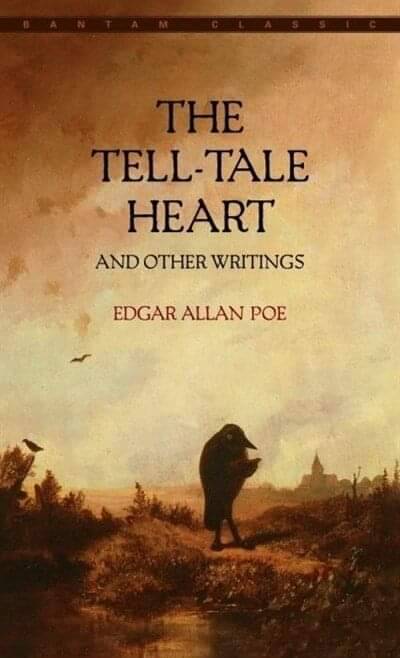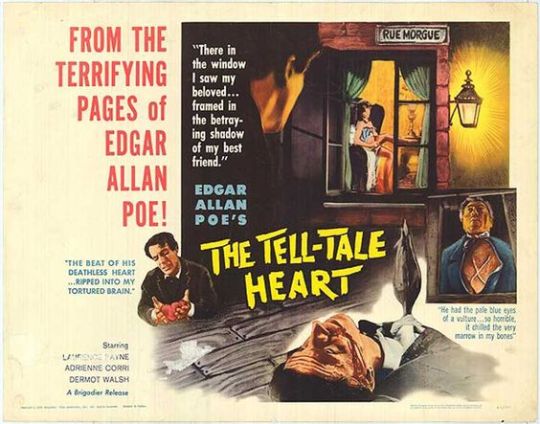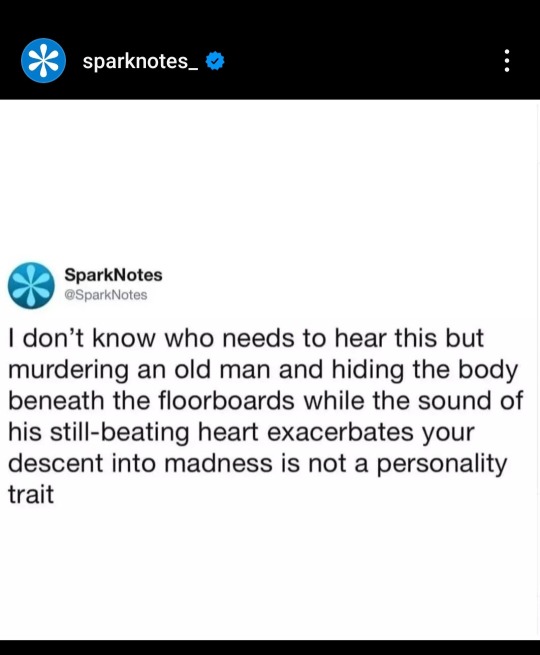#tell-tale heart
Text
”I love being a freak! This is the freaks only site!” Some of you would genuinely murder and dismember someone’s body in the bathtub before hiding it under the floorboards just for looking a bit unusual
💓 💗💓💗💓
23 notes
·
View notes
Text
tell-tale heart
There’s a gentle tapping noise coming from behind him. It takes Will a moment to realise it’s not a stray branch knocking against the cabin. It’s Mike.
Will listens, holds his breath. It’s too rythmic to be casual – measured, even taps of fingertips against the floorboards.
Then it hits him. His name, spelled in dots and lines on the wooden floor.
W.I.L.L
W.I.L.L
W.I.L.L
or; Mike's there for Will, he always is. Of course he is.
*with the intention of unloading weeks worth of heartache on you* hiiiii 💕 have a little thing i wrote to try and cope with the recent spiralling of my life
i hope to get back into writing my stuff soon, as soon as i'll crawl out of this pit of despair 🫡
#[points at writing gay ships] free therapy :D!!!#tell-tale heart#my stuff#byler#i don't post for months and when i do it's *gestures vaguely* that - ugh#whatever -- hope this can help anyone relating to what i wrote (if you do here's you hug -> 🫂)
26 notes
·
View notes
Text

I literally cannot see "Tell-Tale Heart" memes without flashing back to eleventh grade honors English and the Valentine's Day class where I got entirely too carried away while reading aloud and my English teacher did not see fit to step in and stop me from doing an emphatically dramatic reading of the text.
To this day, I'm not sure if I was mortified or proud.
#tell-tale heart#edgar allan poe#sparknotes#classic literature memes#literature memes#when english majors are also theatre kids
5 notes
·
View notes
Text
We’re Fundraising for Art!!

We’re raising funds to create 100%-custom animation for a 30- to 45-second segment of “The Tell-Tale Heart” (movement 3 from “Nevermore” for viola and piano), recently recorded by Charlotte Goode in Rockport, MA (visit this page for photos and behind-the-scenes info from that recording).
Just fill out this form to contribute!
Deadline: Feb. 1, 2023
**Be sure to include an email so I can send you your goodies if you’ve donated at least $15!**
"Wait, what do I get for donating at least $15?"
I’m glad you asked! 😄
You’ll get a high-quality recording (.wav format) of a brand new song from Sarah’s in-progress opera, never before released, ahead of everybody else!
Wanna hear a sample?...
Please consider donating to this exciting project!
#music#recording#fundraiser#nevermore#tell-tale heart#edgar allan poe#trusty hatpin#giving tuesday#donate
33 notes
·
View notes
Text
Helen, thy beauty to is to me
Like those Nicean barks of yore,
That gently, o’er a perfumed sea,
The weary, way worn wanderer bore
To his own native shore.
On desperate seas long wont to roam,
Thy hyacinth, thy classic face,
Thy Naiad airs have brought me home
To the glory that was Greece
And the grandeur that was Rome.
Lo! in yon brilliant window-niche
How statue-like I see thee stand!
The agate lamp within thy hand,
Ah! Psyche, from the regions which
Are Holy Land!
-Edgar Allan Poe, To Helen
5 notes
·
View notes
Text
"steamy romance novel cover for the tell-tale heart by Edgar Allen poe" generated by dall e


3 notes
·
View notes
Text
STORY: The Silence in the Eye
Horror; visceral. Based on the prompt "a story inspired by Edgar Allan Poe's 'The Tell-Tale Heart'."
If you enjoyed it, feel free to visit my Patreon.
The Silence in the Eye, by Christina Nordlander
No longer to be able to trust one’s senses is such a fate that one may argue whether it is milder than the gallows: to live out one’s life in chains that are intended to keep one alive, with a soul that has turned from the body’s sovereign to its parasite, which lies to itself, paralyzes itself with terror, and pre-empts the very Pit with a thousand scourges that have never been found within its walls. I do not believe that I am insane, but how might I trust my sensations, when desire is more powerful?
Posit, however, that I am insane; that what I fear more than Hell has already happened. I do not wish to consider it, but I cannot seek a remedy if I refuse to acknowledge the possibility. Can you then say whether it was madness that prompted me to commit the deed, or whether it was what I have done, and suffered, that fired the first shot? Perhaps I must relate all events, with all the acuity of which I am capable, so that you too may decide which is the truth.
It pains me to speak of my feelings for the old man, for they are thankless and less cordial than he deserved. He let me into his home, and shared more of food and board than the law requires of one not one’s own blood, but he was often curt, cross, or violent. Loving him was hard; too hard for me.
Yet he did not deserve such a fate.
I would never have raised my hand against him. It was his one eye, the sick one, that I hated.
I can attempt to describe it, but I sense that even if I amass details, I will not be able to give you an inkling of the effect it has had upon me. Imagine an eye – the right one –, drawn over with a pale film: not entirely intransparent, but so near as to make it nigh impossible to tell white from iris or iris from pupil; so thick that it is impossible to determine which processes of putrefaction have begun within.
Perhaps these details disgust you? I think, however, that the deeper meaning might evade you. Of force, I lived in his house day and night – although night, when that eye was buried in its lid, frightened me less –, and the thought came frequently that it would infect me, that the same film would grow on my eye, unable to be cut away, or send thready roots into the deeper layers of the orb, and the thought came frequently that his eye had changed, or turned, into something else, and that something not of this earth observed me through it. I thought, as I watched him while I set the table or heated his bed-cushions, that the lid over that eye lowered less than its counterpart, as if he used it to always keep watch over me. I also thought that the right side is the one associated with goodness and reason, and that if the right eye were thus blemished, might not his very being be eaten through with corruption?
My most recurring fear, however, was that of contagion. As his servant, I was always close to his person, and it occurred to me that, as his health worsened, I would of force need to dry his eye, wash it, handle it. I knew that on that day, that unknown germ would enter me, or else I would live sick with fear until it happened. My right eye would weep, and the tears would not run, but lie as a coating on its surface until it could weep no more.
Flee? For a while I might have been able to entertain the thought, even if I would have had to live in the gutter, with the autumn sky growing cold above me. Now I no longer dared try. I knew that the eye kept watch, and I knew that I would find all doors locked, or my possessions half charred in the heating-stove, the moment I took the leap.
Perhaps I am insane. Does not, then, any man go insane who is forced to live with terror, during daytime and in his dreams?
I took the greatest bread-knife in the kitchen and ground it until it could take no more edge, until the edge was as thin as silk. I found a dark lantern in the basement and tried it with a candle-end during a moment of freedom. The opening was too great, so I drilled a little hole in the shutter, and saw a beam that was strong enough to give lead-light. None of these actions was irreversible. It was the realization that I might still return to my daily life that let me go on, as if this might still be a rehearsal.
The final evening, after I had lit the old man to his bed where the sheet-linen was still rustling and dry from the hot-water bottle, I washed clouts and hung them to dry before the stove, and realized then that I had taken the last step and could no longer turn back, no more than one falling. I washed my hands several times. I lit my lantern, took the clouts and the knife, and padded through the hallway to his bedroom, and after each step I tarried, until I knew beyond all doubt that I had not made a sound, and then took the next.
The doorknob moved soundless in my grip. I took the first step onto the bedchamber floor, alien – it seemed to me – like a frozen lake, and stepped towards the drawn bed-curtain with the beam swinging without restraint on the floorboards before me.
The hangings slid aside with a sound like a breath. I realized that I could not turn the lantern forward, lest the beam would fall on his eye and my courage fail me. I set the lantern on the scuffed and rickety nightstand. It should have made a noise; the parts of the lantern should have clattered, the joins should have creaked. Perhaps the noises arose, but I was in a circle of silence.
I do not wish to put words on what followed. Let this relation be the place where I may say “it was done.” In that phrase, I tie up all that night had of exhausting nightmares, and make it into something scoured and completed. It was done, and I took the clouts down to the laundry and put them in the tub so that they dyed the water pink. I put all my clothes in the wash, even those that were not bespattered, and put my hands in the hot lye-drenched water until the pain faded again, leaving only a vague tingling.
My peace of mind endured one day. The following, raw and grey with rain that made a mud-flood of the refuse in the gutter, two men called and identified themselves as officers of the law.
I went out into the kitchen and made tea, and the old man sat slack in the dully red-patterned armchair while the policemen pulled out chairs. I was aware of the different objects as if a web of taut strings ran between them: the knife, now brightly scoured in its rack; the old man with his white bandage across the right side of his face; and the thing I had sunk deep beneath the floorboard.
As I returned to the dining-room, the jangling tray balanced in my hands, no-one’s looks showed any sign of understanding.
I poured tea for all, and went to stand by the armchair in the event that my presence would be required. My eye itched. It was the kind of itch that would have been resolved in a moment, had I been able to use my fingers. Resolved; the word reminded me of something fluid, something that wept until only liquid was left. Even its constituent sounds were mixed and runny. I had washed my hands in lye until my skin no longer resembled skin, and yet nothing could have brought me to touch my eyes with my bare hands. I stood there, hearing them question the old man, and remembered one of the Norse tales from a book I had had as a child, of Loki turning himself to a gadfly and stinging the eyelid of a dwarf blacksmith to distract him from his work. I tried to blink to make the tears run and take the pain with them – it was pain now –, but it occurred to me that my flickering eyelid was more noticeable to the officers than a quick raising and lowering of my hand. If I had been allowed a moment’s solitude, I would have dried my eye with a corner of my garment.
The officers spoke, the old man replied. I do not remember their words. I clawed my palm with my fingernails, time and again, as if I might fool my body into thinking that I was rubbing the eye, and I did not think that the motion and the play of my features might be noticeable to them. In my mind, I had put my eye out, half a dozen times.
At last I heard chair-seats creak and saw legs straighten. The officers shook hands once more with the master of the house, and filed into the entryway. I followed them out as they grabbed hats and coats, and was so relieved, I did not know whether I walked or floated.
They left, and I rubbed my eye with a strip of fabric, and the weeping did not stop. Had I then touched my eye after the deed? I racked my mind and could not remember.
The old man had fled to his bedroom. Perhaps he had locked the door, as if he would not have to open it sooner or later.
And what lay buried beneath the floorboards never made a sound.
THE END
0 notes
Text

"The Tell-Tale Heart" is a famous short story written by Edgar Allan Poe, first published in 1843. It is a chilling tale told from the perspective of an unnamed narrator who insists on their sanity while describing the murder they have committed. The narrator becomes obsessed with the old man's vulture-like eye, claiming it drives them to madness.
A critical analysis of Edgar Allan Poe's "The Tell-Tale Heart" can delve deeper into its themes, narrative style, and literary elements:
1. **Narrative Unreliability**: The story is narrated by an unnamed protagonist who insists on their sanity while exhibiting increasingly erratic behavior. This unreliable narrator adds a layer of complexity to the narrative, making readers question the truth of the events described.
2. **Psychological Horror**: Poe masterfully explores the depths of human psychology in this tale. The narrator's obsession with the old man's eye and the subsequent murder showcase the fragility of the human mind and the irrationality of their actions.
3. **Symbolism**: The vulture-like eye of the old man can be seen as a symbol of the narrator's own guilt and moral decay. The incessant beating of the heart after the murder can symbolize the relentless torment of a guilty conscience.
4. **Foreshadowing**: Poe uses foreshadowing to build tension throughout the story. The narrator's insistence that they are not mad and their acute sensitivity to sound foreshadow the events that unfold.
5. **Tone and Atmosphere**: Poe's use of vivid and darkly descriptive language creates a palpable atmosphere of dread and suspense. This contributes significantly to the story's overall impact.
6. **Narrative Structure**: "The Tell-Tale Heart" is a first-person narrative, allowing readers to directly experience the narrator's descent into madness. This intimate perspective intensifies the psychological horror.
7. **Moral Ambiguity**: The story raises questions about morality and the nature of evil. It invites readers to ponder the boundaries between sanity and insanity, right and wrong.
8. **Irony**: The story is filled with dramatic irony, as readers are aware of the narrator's madness while the character remains convinced of their sanity. This creates a sense of dramatic tension.
In essence, "The Tell-Tale Heart" is a masterpiece of Gothic literature that explores the dark recesses of the human mind. Through its unreliable narrator, symbolism, and psychological horror elements, Poe crafts a tale that continues to captivate and unsettle readers, inviting them to contemplate the complexities of guilt, obsession, and the thin line between sanity and madness.
1 note
·
View note
Text

I'll provide zero context for this. You're welcome.
0 notes
Text
wait.. Christopher Lee Tale-Tell Heart narration…
youtube
3 notes
·
View notes
Text
#cc#music#edgar allen poe#the tell tale heart#the cask of amontillado#annabel lee#the fall of the house of usher#the bells poe#the purloined letter#the masque of the red death#the raven poem
7K notes
·
View notes
Video
youtube
The Tell Tale Heart
0 notes
Text
A Mystery of Mysteries: The Death and Life of Edgar Allan Poe by Mark Dawidziak #NetGalley #eARCReview #BookReview #February2023Books #NewBooks
It is a moment shrouded in horror and mystery. Edgar Allan Poe died on October 7, 1849, at just forty, in a painful, utterly bizarre manner that would not have been out of place in one of his own tales of terror. What was the cause of his untimely death, and what happened to him during the three missing days before he was found, delirious and “in great distress” on the streets of Baltimore,…

View On WordPress
#Advanced Reader&039;s Copy#Annabel Lee#ARC Review#Biography#Black Cat#Edgar Allan Poe#Horror Stories#Mark Dawidziak#Murders in the Rue Morgue#Mystery of Mysteries: The Death and Life of Edgar Allan Poe#NetGalley#Tales of Terror#Tell-Tale Heart#The Raven
0 notes

